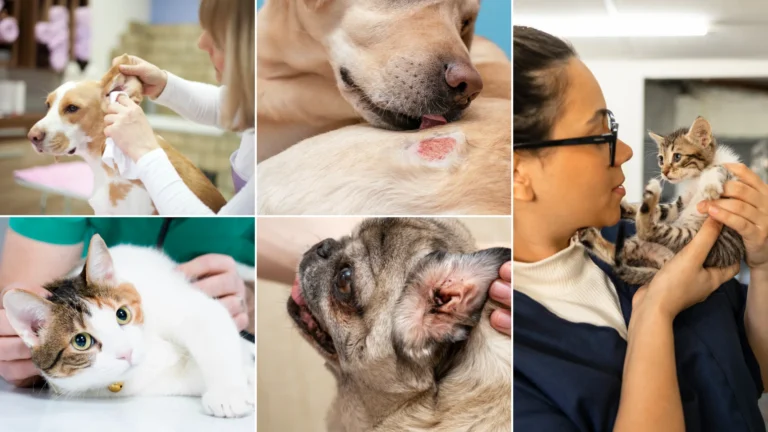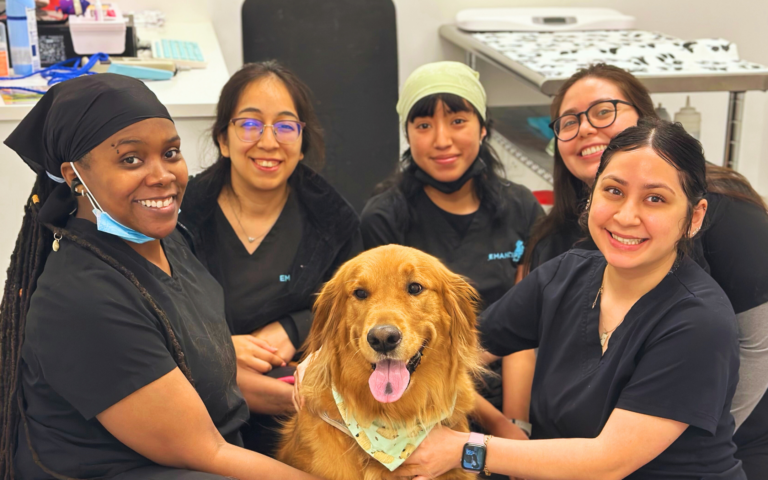What are common dental issues pets may have?
Just like humans, pets can also develop tartar on their teeth, which can cause gum inflammation as well as disease under the gum line. Eventually this can lead to dental pain and infection, as well as loss of the bone tissue that keeps the tooth in place in the mouth.
Is teeth brushing effective?
Yes. Brushing your pet’s teeth is the most effective way to prevent dental disease and tartar build up.
Find The Right Toothbrush
Pet stores commonly carry toothbrush kits for pets that contain a toothbrush and toothpaste that is appealing to most pets, such as beef or chicken flavor.
You can even use regular toothbrushes for people, for pets. For larger dogs, you can use normal adult size human toothbrushes, and for smaller dogs and cats, you could even use toddler sized human toothbrushes. Some people find finger brushes to be easier to use than toothbrushes with handles.
Start Early & Brush Often
The sooner you start introducing toothbrushing to pets, the sooner they will get used to their routine. Around eight weeks of age is a good age to start.
Tartar takes about 36 hours to harden on the teeth, so brushing the teeth at least every other day is a good practice.
Do dental treats actually work?
Dental treats do work to scrape the tartar off of teeth when it isn’t possible to brush your pet’s teeth or when you’re not able to brush them as often as you would like.
A good rule of thumb for choosing dental treats is to look for the VOHC seal on the bag of treats. This stands for Veterinary Oral Health Council.
How do I take care of my cat’s teeth?
Just like dogs, cats also benefit from having their teeth brushed at least every other day. If this is not possible, or if you’re not able to brush your cat’s teeth as often as you would like, look for cat dental treats with the VOHC seal on them.
How can I maintain clean teeth when my pet won’t chew on dental treats or let me brush?
Some pets are picky about which dental chews they prefer, so you might have to try a few different kinds to find one they like.
Try Different Toothpaste Flavors & Toothbrush Types
You may also need to try different flavors of toothpaste, such as beef versus chicken or liver, as well as different kinds of toothbrushes, such as one with a handle versus a finger brush to make the routine smoother for you in your pet.
Motivate them With Treats
Most pets are motivated by training treats. So when trying to introduce a new behavior such as toothbrushing, it can be helpful to reinforce their cooperation by giving them delicious treats, as well as offering them lots of praise when they cooperate with the toothbrushing.
Be consistent and keep the training sessions short to only a few minutes per day and stay upbeat and positive.
Is soft or hard food better for my pet’s teeth?
Now we know that it’s mostly a combination of genetics and, dental hygiene that determines how quickly pets build up tartar on their teeth.
A Mix is Best
Dr. Sthanu recommends feeding dogs a mix of wet and dry food, and feeding cats a mainly canned food diet to help maintain a healthy weight and to prevent urinary tract problems.
How do I know when my pet just needs a cleaning rather than an extraction?
It isn’t usually possible to tell whether a tooth needs to be extracted just by looking in a pet’s mouth. This is because most of the tooth is actually under the gum line, and so x-rays need to be performed to see whether there’s any loss of bone or signs of infection, which would be reasons for the teeth to need to be extracted.
What dental services does Emancipet provide?
We provide comprehensive oral health assessments and treatments, also known as dental cleanings. During this procedure, we place a pet under anesthesia, take x-rays of their teeth, do complete cleaning and polishing of each tooth.
We also probe each tooth to identify pockets of bone loss as well as extract any teeth that are shown to have any pockets of infection or bone or bone loss on the x-rays.
Currently, our dental cleanings are only provided at the Norwood Park Boulevard location in central Austin, but we hope to be able to expand the service very soon.
Your pet must receive an oral examination at our clinics before a dental procedure can be scheduled.
Remember, pet’s teeth need care just like our own teeth do.




